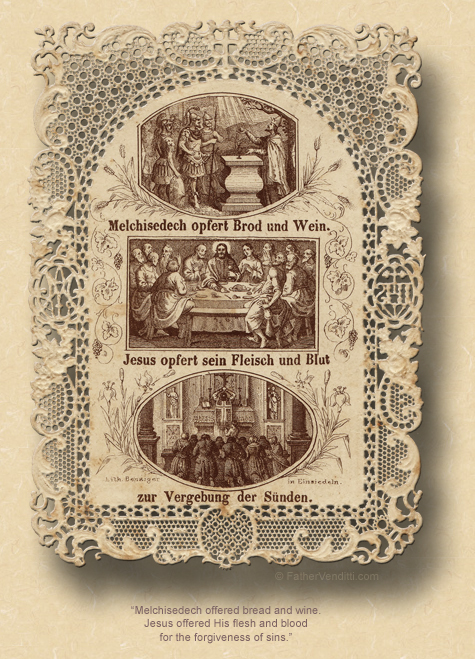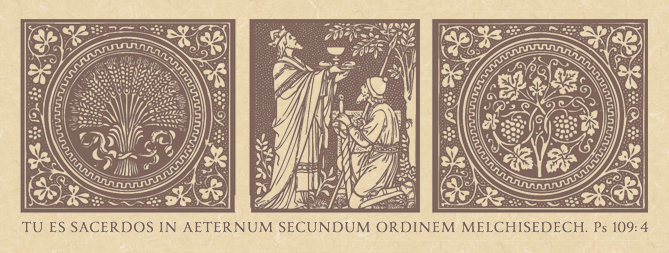It's Time to Let Our Priests Be Priests.
The Second Saturday of Easter.
Lessons from the feria, according to the ordinary form of the Roman Rite:
• Acts 6: 1-7.
• Psalm 33: 1-2, 4-5, 18-19.
• John 6: 16-21.
The Saturday after Low Sunday.
Lessons from the dominica, according to the extraordinary form of the Roman Rite:
• I John 5: 4-10.
• John 20: 19-31.*
The Feast of Our Venerable Father John, Disciple of the Holy Gregory the Decapolite.
Lessons from the pentecostarion, according to the typicon of the Byzantine-Ruthenian Rite:
• Acts 5: 21-33.
• John 6: 14-27.
FatherVenditti.com
|
 1:58 PM 4/18/2015 — The Apostolic lesson of today's Mass is the ordination of the first deacons; but, when you look at the reading from Acts carefully, you realize that it's much more about priests than about deacons. 1:58 PM 4/18/2015 — The Apostolic lesson of today's Mass is the ordination of the first deacons; but, when you look at the reading from Acts carefully, you realize that it's much more about priests than about deacons.
What is the reason the Twelve give for the ordination of the Church's first seven deacons? They say, “It is not right for us to neglect the word of God to serve at table” (Acts 6: 2 NABRE). They were not running a restaurant. The Church, as it does to this day, cared for the poor; at Holy Mass, collections were taken up, just as they are today, and much of what was collected went to those in need, and this required a lot of footwork. The Apostles had been doing it all themselves, but it soon became clear that they couldn't give enough attention to preparing for and celebrating the sacred mysteries if they also had to be involved in all these charitable activities; so, the deacons were ordained to do this sort of work for them.
And what's important for us to notice is that, even in the time of the Apostles, there is already a well-defined division of labor in the Church: the job of the priest is to offer sacrifice and preach the Word of God; the more pragmatic duties of the Church are given to others, and specifically for the reason of leaving the priests free to perform their sacred functions.
I was a pastor for many years, and one of the most frustrating things about being a pastor is that most of what you do has nothing to do with being a priest: you are a maintenance man, you are an accountant, you are social worker, you are a marriage counselor, you are a fund raiser, you are everything except what you were ordained to be, which is a preacher of the Word and an offer-er of sacrifice. When Pope Blessed Paul VI reinstated the deaconate as a permanent ministry in the Church, no longer restricting it to those in preparation for the priesthood, his idea was to correct this problem; but, it didn't turn out that way, as most of the deacons ordained since then are all married men with jobs and lives of their own, and whose deaconate is more or less restricted to helping out at Holy Mass on Sundays, which, as you can see from today's first lesson, has nothing to do with what they were originally ordained to do. There is no evidence that, in the early Church, the deacons had any liturgical functions; certainly in the Scriptures they had none.
What I want to offer for your reflection today is a simple and brief appeal to not only pray for priests every day, which I'm sure you do, but also encourage you to make a resolution to let your priests be priests. The Holy Priesthood is not an office of authority, but an office of service; he stands in the place of Christ as a victim for sin, one who leads us in prayer and presents to Almighty God the offering of sacrifice for the remission of sin on behalf of the souls entrusted to his care; and we should not attempt to draw him out of the role.
Take confession, for example. So many times we go into the confessional and start telling the priest about our problems, but that's not what he's there for; he's there to hear us accuse ourselves of our sins on behalf of Christ, impose whatever penance is appropriate, and impart to us our Lord's absolution. Why we sinned, what led us to sin, what we're feeling about our sins is not relevant. “Father, my daughter-in-law makes me so mad…” Except you're not there to confess your daughter-in-law's sins; you're there to confess your sins. Why you said something uncharitable to your daughter-in-law doesn't matter, and the priest has no need to know that; all he needs to know to absolve you is that you said it and that you're sorry.
I think it's important to meditate frequently on the last line of today's lesson; for, what was the result of the ordination of the deacons? What did the commission to these seven men to assume the more mundane tasks of the Church do? “The word of God continued to spread, and the number of disciples in Jerusalem increased greatly; even a large number of priests were becoming obedient to the faith” (6: 7 NABRE). Saint Luke is, of course, speaking of Jewish priests in that last sentence, but the irony of his choice of words should not be lost on us. If we have ever been concerned about the holiness of our priests, if we have ever wondered why this priest or that whom we may know is not what we think he should be as a priest of Jesus Christ, one of the reasons may be that we keep expecting him to be what he is not. After the example of our Lord, the priest is ordained to guide, to teach, and to sanctify. Everything else is—or at least should be—irrelevant for him.
So, let us pray for our priests, but—just as importantly—let us also resolve to let our priests be priests.

* In the extraordinary form of the Roman Rite, outside of privileged seasons, the lessons for ferial days are those of the preceding Sunday; also, from Easter Saturday until the end of Paschaltide, the Gradual Psalm is omitted.
|

